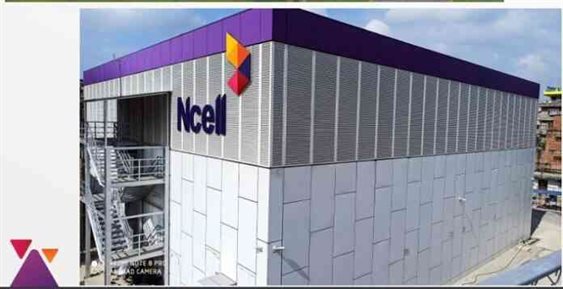Ncell’s Data Centre At Nakkhu: First Of Its Kind In South Asia
18th February 2023, Kathmandu
Ncell, a private telecom service provider, has built a state-of-the-art data center in Nakkhu, Lalitpur that is now ready to use. The data center started operating during the Covid-19 pandemic.
Ncell observed the problem of data loss and service disruptions after the 2015 earthquake and decided to construct a data center (DC). Despite facing several challenges during the coronavirus pandemic, Ncell has successfully built the data center. It is a Tier Three Plus-rated facility, which Ncell claims, is the first of its kind in South Asia.
It is assumed that the data center is constructed with an investment of Rs 2 Arab. Among Ncell’s own network of data centers, this one at Nakkhu in Lalitpur is the fourth DC but with the highest capacity and investment. The other three data centers are situated in Pokhara, Hetauda/Birjung, and Biratnagar.
Ncell’s Data Centre Overview
The data center is equipped to keep running even during long power outages thanks to its diesel plant with a capacity of 5 MW and five backup generators. Ncell’s data center has 250 racks, which other companies can use for their telecommunication and data needs. The data center building is constructed using 48 containers with a life of 25 years, and three halls are in the two-story building.
The data centre also features technical and equipped rooms, an information processing centre, and an operation center. The center has a design load of 2250 kW, and its AC rack runs on 220 voltage while its DC rack runs on 48 voltage. It has a system of One Plus One, which means that one system can run the other when it breaks down. Additionally, the UPS backup is designed to last for 30 minutes in the event of a problem with the electricity authority’s grid.
The center has Vesda technology installed, which is a fire detection technology that can detect any fire automatically. Similarly, Ncell has arranged Novak 1230, an automatic technology to extinguish the fire. According to the company, the data center is secure and all types of security measures have been applied along with 24-hour monitoring of the facility.
Ncell has built an underground tank with a capacity of 50,000, and the center’s capacity can be expanded by an additional 40 percent.
What is a Data Centre?
A data center is a specialized facility used to house computer systems and related components, such as telecommunications and storage systems. It is a centralized location where organizations and businesses can store, manage, and process large amounts of data.
An internet data center, also known as an IDC, is a type of data center that is specifically designed to support internet-based services and applications.
Data centers are designed to provide a secure and reliable environment for servers, storage devices, networking equipment, and other critical computing infrastructure. They typically have backup power supplies, redundant data communications connections, environmental controls (such as air conditioning and fire suppression), and various security devices to protect against unauthorized access, data breaches, and other risks.
Data centers are used by a wide range of organizations, from small businesses to large corporations, cloud computing providers, and government agencies.
What are the features of an Internet Data Centre?
1. High-speed internet connectivity:
An internet data center typically has multiple high-speed connections to the internet to ensure fast and reliable access to online services and applications.
2. Redundant networking and power infrastructure:
Internet data centers often have multiple layers of redundancy built into their networking and power infrastructure to ensure uninterrupted service in the event of equipment failure or power outages.
3. High levels of physical security:
Internet data centers are typically designed with advanced security measures, including access controls, video surveillance, and biometric authentication, to protect against physical and cyber threats.
4. Scalable infrastructure:
Internet data centers are designed to be scalable, meaning that they can be easily expanded to accommodate the growing demand for internet-based services and applications.
5. Advanced cooling systems:
The high-density computing equipment in internet data centers generates a significant amount of heat, so these facilities often have advanced cooling systems to maintain optimal operating temperatures and prevent equipment damage.
6. Robust backup and disaster recovery capabilities:
Internet data centers typically have robust backup and disaster recovery capabilities to ensure that data and services can be quickly restored in the event of an outage or disaster.
Ncell’s Data Center Infrastructure Management (DCIM) System
DCIM solutions help data center managers optimize performance and efficiency by monitoring, analyzing, and managing power and cooling resources, tracking capacity utilization, and identifying opportunities for cost savings and efficiency improvements.
Ncell’s DCIM system provides automation capabilities for tasks such as maintenance and firefighting, which improves the business’ operational efficiency and reduces the risk of human error.
- Automatic maintenance helps reduce maintenance labor costs by 35%
- AI energy optimization reduces data center energy consumption by 8%
- The fire protection system triggers an automatic fire alarm and extinguishing system






